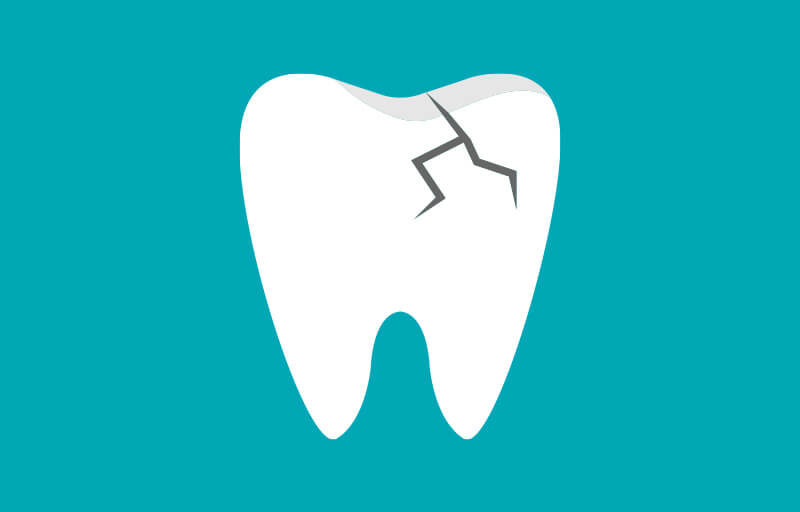The outer layer of teeth, called enamel, is the hardest substance in the human body – even harder than bone. But enamel is not indestructible. Here’s how to keep the cracks and chips from damaging your smile, confidence, and health.
Tooth decay
When a tooth is weakened by decay, it may not be strong enough to withstand the forces exerted on it during chewing or other activities, leading to cracks or fractures. Additionally, when a cavity is left untreated and allowed to progress, it can lead to larger areas of decay that weaken the tooth even further and increase the likelihood of cracks developing.
Biting down hard
Teeth are strong, but they have their limits. Biting down on something too hard, such as a chunk of ice or a piece of hard candy can cause tiny cracks in the enamel of your teeth. Over time, these cracks can get bigger and deeper, leading to more serious damage. Sometimes, simply biting down on a hard object can even cause a tooth to break or split in half. The healthier your teeth are, the less likely they are to be damaged by this type of dental incident.
Temperature changes
Sudden changes in temperature, such as eating hot food and then drinking cold water, can cause teeth to expand and contract rapidly, leading to cracks over time. As noted above, healthy teeth are far less likely to be impacted by temperature changes than teeth with existing problems.
Aging
As you get older, your teeth can become more brittle and weaker due to several factors, such as wear and tear, decay, and gum disease. These situations, among others, can make them more prone to cracking or breaking, especially if you bite down on something hard or experience trauma to your mouth. It’s important to practice good oral hygiene and visit your dentist regularly to prevent these issues from occurring.
Teeth Grinding
The causes of bruxism – that’s the medical term for teeth grinding – include stress, anxiety, an abnormal bite or sleep disorders. Bruxism can, in the worst cases, weaken teeth, fracture fillings, crack crowns and destroy dental implants and other restorative dental work.
It’s common for people to be totally unaware they are grinding their teeth, as it typically happens during sleep. Some signs you’re grinding your teeth (other than a sleep deprived partner telling you so) include:
- Sore jaw
- Clicking sound when you open your mouth
- Dull constant headache that originates around the temples
- Tenderness around the sides of your face
- Increased sensitivity to hot and cold food (or drinks)
- Indentations on your tongue
The most common preventive treatment for severe teeth grinding cases is to wear “a night bite plate” or a “bite splint.” Your dentist can fit one for you.
What are “stress cracks” in teeth?
Stress cracks are tiny, hairline cracks that can occur on the surface of teeth. They are also known as craze lines and are usually very shallow. However, if they become more severe and extend deeper into the tooth, they can lead to more serious problems such as a cracked tooth or even tooth loss. If you have stress cracks in your teeth, ask your dentist about them during your next checkup.
Can stress actually make your teeth fall out?
Stress alone will not cause tooth loss but can contribute to oral and overall health problems that can result in weakened teeth and, eventually, potential tooth loss. When you are under stress or are experiencing anxiety, your brain prompts your adrenal glands to release a surge of hormones, including adrenaline and cortisol, that are useful in helping you to fight the threat or run away from it very quickly. This can be a great response to danger, but is less appropriate to the stresses of modern life. An overabundance of adrenaline in your system can cause you to grind your teeth. It can also cause high blood pressure, angina, headaches, upset stomach, heartburn, sore throats (due to dry mouth, which is also bad for your teeth), and sleep disorders.
Restoring your smile with a dental savings plan
If you cracked or chipped a tooth, your dentist can restore your smile with treatments ranging from bonding, veneers and crowns, or even a brand new replacement tooth if necessary.
Good oral health habits can help your teeth resist stress-related damage too. Brushing and flossing, done right, plus getting regular dental checkups and professional cleanings, are the best ways to keep your teeth and gums healthy.
If you’ve been putting off seeing a dentist due to cost, we can help you find a dental plan that offers the best care at the best value. Call us at 1-833-735-0399 to learn more about the dental savings plans and dental insurance we offer. You’ll see how simple and affordable dental care can be.

 Login
Login